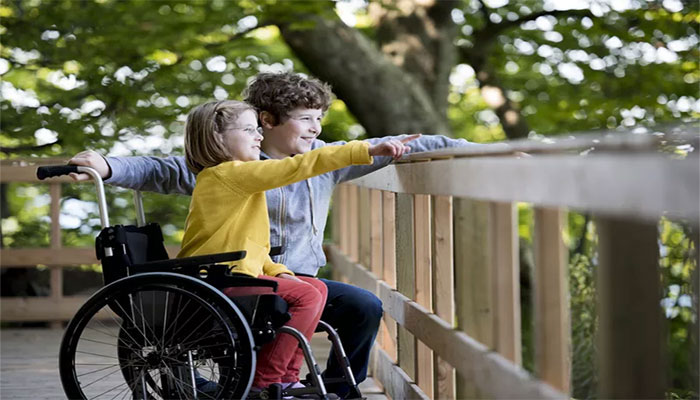Call for compassion and respect for children with disabilities
The Circle: Caring For Children held a discussion for parents in which 4 renowned experts spoke about various aspects of therapy, education and inclusion of children with disabilities. The speakers included Eva Barner a renowned Austrian trainer, mentor and speech and language expert, Dr Muneera Rasheed, Clinical Psychologist and Social Innovator, Abid Hasan, Communications Specialist from UNICEF and Sadaf Mateen, CEO & Chief Speech & Language Pathologist, The Circle.
The discussion was held to commemorate the World Disability Day which is observed on 3rd December every year. At the outset Sadaf Mateen said that a yardstick for success is that children with disabilities come for therapy happily, go back happily. Therapy should be a pleasant learning experience to which early intervention is the key.
Sadaf Mateen, CEO and chief therapist of The Circle, said this at an awareness discussion titled ‘Early Intervention. Inclusion. Coping with the Pandemic’ was the 7th seminar organised by The Circle-Caring for Children.
The event started with a documentary on neuroplasticity, which is the key to understand how human beings learn. The audience was informed that the learning of children was like making footprints on the sand as whenever they learned something, it left impression in the network of their nerves.
The documentary explained in details the ill effects of excessive screen time on children on a variety of fronts. Research has established that if children always carried tablets or smart phones around, many areas of their brain would not develop resulting in the possibility of autistic behaviour.
The documentary stated that digital addiction among children was constantly increasing and it was no different than drug addiction. It was said that it is up to parents, teachers and educators to inspire children for exciting alternatives so they can make music, sing songs, play sports, perform theatre, hike, climb, and become enthusiastic about nature.
Eva Barner, renowned speech-language pathologist from Austria, spoke on the requirements for healthy child development. For the positive development of a child, she said, there was a need for an interlinked set of conditions. Children’s activities, she said, followed the genetic structure of their brains.
The environment was the most important thing for a child. The behaviour is the structure of the brain and the confrontation with and the adaption through the environment was very necessary, she added. “The confrontation and adaptation are influencing the structure of the brain and there we help the child for a good development.”
Self-consciousness, learning ability, attention, ability to act, self-efficacy and social skills, the Austrian expert said, formed the basics for a positive self-concept and emotional intelligence. “This is all we want children to learn,” she said, adding that if there were difficulties in these, it might lead to attention deficit hyperactivity disorder (ADHA), learning disorders, dyslexia, dyscalculia, speech and language disorders, partial performance disorders and autism spectrum disorders.
She explained that components of healthy environment were nutrition, behaviour towards the child, encouraging movement and motor skills. As for nutrition, she said, a child should have a healthy digestion and the diet should be balanced and rich in nutrients.
She explained that if healthy digestion did not happen, there could be allergies and food intolerance. Healthy metabolism, she said, was very necessary, or else there could be an impaired thyroid function, which, if too low, could result in the child being too slow. Diabetes was also related to the children’s consumption of sugar, she said.
Another important thing, Barner said, was that the children took sufficient liquids. Clean air was necessary for securing the children from allergies and asthma, she said.
For good behaviour, she said, there had to be sensitive parents and teachers, positive parenting behaviour, individual flexible educational concepts, child-friendly architecture, living conditions, appropriate stimulation, small classes and frontal teaching.
UNICEF Communication Specialist Abid Hasan shared that almost 240 million children with disabilities existed around the world as per a new Unicef report. “This new research confirms what we already knew. Children with disabilities face multiple and often compounding challenges in realising their rights, from access to education, to being read to at home; children with disabilities are less likely to be included or heard on almost every measure. All too often, children with disabilities are simply being left behind,” he quoted the Unicef executive director.
He explained that compared with children without disabilities, children with disabilities were 24 per cent less likely to receive early stimulation and responsive care, 42 per cent less likely to have foundational reading numeracy skills, 25 per cent more likely to be wasted and 34 per cent more likely to be stunted, 53 per cent likely to have symptoms of acute respiratory infection, 49 per cent more likely to have never attended the school, 47 per cent more likely to be out of primary school, 33 per cent more likely to be out of lower-secondary school and 27 per cent more likely to be out of upper secondary school, 52 per cent more likely to feel unhappy, 41 per cent more likely to feel discriminated against and 32 per cent more likely to
experience severe corporal punishment.
Unicef, he said, worked with partners at global and local levels to help realise the rights of children with disabilities. All children including those with disabilities must have a say in the issues that affect their lives, and be provided with the opportunity to realise their potential and claim their rights.
Clinical psychologist and social innovator Dr Muneera Rasheed said if someone catches fever, the parents are unable to sleep until the fever goes away. “What about those parents whose children have a lifelong fever?” she asked, adding that how as a psychologist, she can ask them not to get worried. Why is it all about those parents whose children are disabled and why they have to take care of all the responsibilities and bear with the society’s attitude?”
This is where, she said, parents actually felt stress for having a child with no future. “Will my child be accepted? Will my child be able to go to school? Will the school’s children accept my child? When I was practising, I had children with diabetes who were going through extreme bullying in the school,” she shared. The society, she said, needs more compassion and empathy and respect should be the new fashion.
-
 Demi Lovato Leaves Fans Disappointed With Unexpected Announcement
Demi Lovato Leaves Fans Disappointed With Unexpected Announcement -
 Pacers Vs Knicks Overtime Thriller Ends In Heartbreak For New York
Pacers Vs Knicks Overtime Thriller Ends In Heartbreak For New York -
 Who Owns The Ambassador Bridge? New Report Links Owner Matthew Moroun To Trump’s Threat
Who Owns The Ambassador Bridge? New Report Links Owner Matthew Moroun To Trump’s Threat -
 ICE Detention Center Plan Sparks Controversy In Maryland As Lawmakers Push Back
ICE Detention Center Plan Sparks Controversy In Maryland As Lawmakers Push Back -
 Blood Pressure Medication Recalled After Wrong Tablets Found In Bottles
Blood Pressure Medication Recalled After Wrong Tablets Found In Bottles -
 Why Ariana Grande Wants A 'tiny Mouse' To Play Her In Biopic?
Why Ariana Grande Wants A 'tiny Mouse' To Play Her In Biopic? -
 Wind Chill Returns With Brutal Cold As Polar Vortex Stalls Over Canada
Wind Chill Returns With Brutal Cold As Polar Vortex Stalls Over Canada -
 Princess Beatrice, Eugenie ‘do Not Want To Be Seen In Public’ Because Of Dad
Princess Beatrice, Eugenie ‘do Not Want To Be Seen In Public’ Because Of Dad -
 Costco $20 Rule Explained As Employee Pay Climbs Across North America
Costco $20 Rule Explained As Employee Pay Climbs Across North America -
 Strange Incident Happened At Nancy Guthrie's Home On Abduction's 10th Day
Strange Incident Happened At Nancy Guthrie's Home On Abduction's 10th Day -
 Tumbler Ridge School Lockdown Underway As RCMP Investigate School Shooting
Tumbler Ridge School Lockdown Underway As RCMP Investigate School Shooting -
 Royal Family Knows There Can Be ‘no More Glossing’ Of Andrew Downfall
Royal Family Knows There Can Be ‘no More Glossing’ Of Andrew Downfall -
 Britney Spears Quietly Parts Ways With Her Music Catalog: Report
Britney Spears Quietly Parts Ways With Her Music Catalog: Report -
 Princess Diana Bodyguard Suspected ‘she Could Die’: Here’s How
Princess Diana Bodyguard Suspected ‘she Could Die’: Here’s How -
 Teddi Mellencamp Marks Huge Milestone With Emotional Message Amid Cancer
Teddi Mellencamp Marks Huge Milestone With Emotional Message Amid Cancer -
 Shamed Andrew To ‘kiss And Tell’ After Dip In Popularity
Shamed Andrew To ‘kiss And Tell’ After Dip In Popularity




